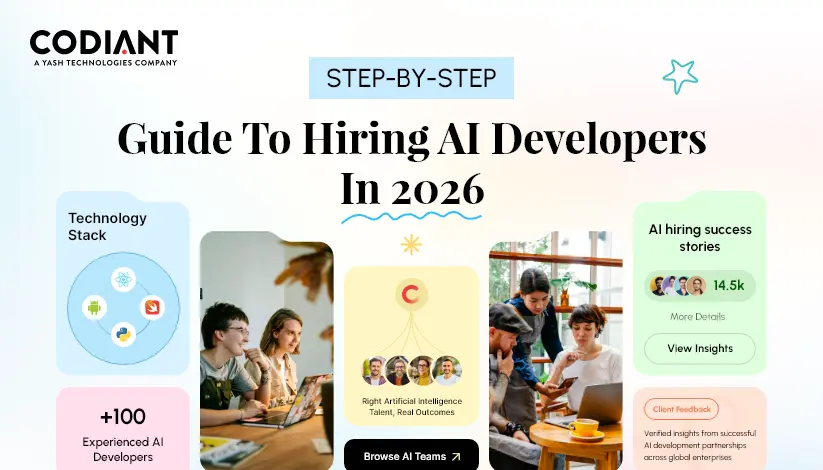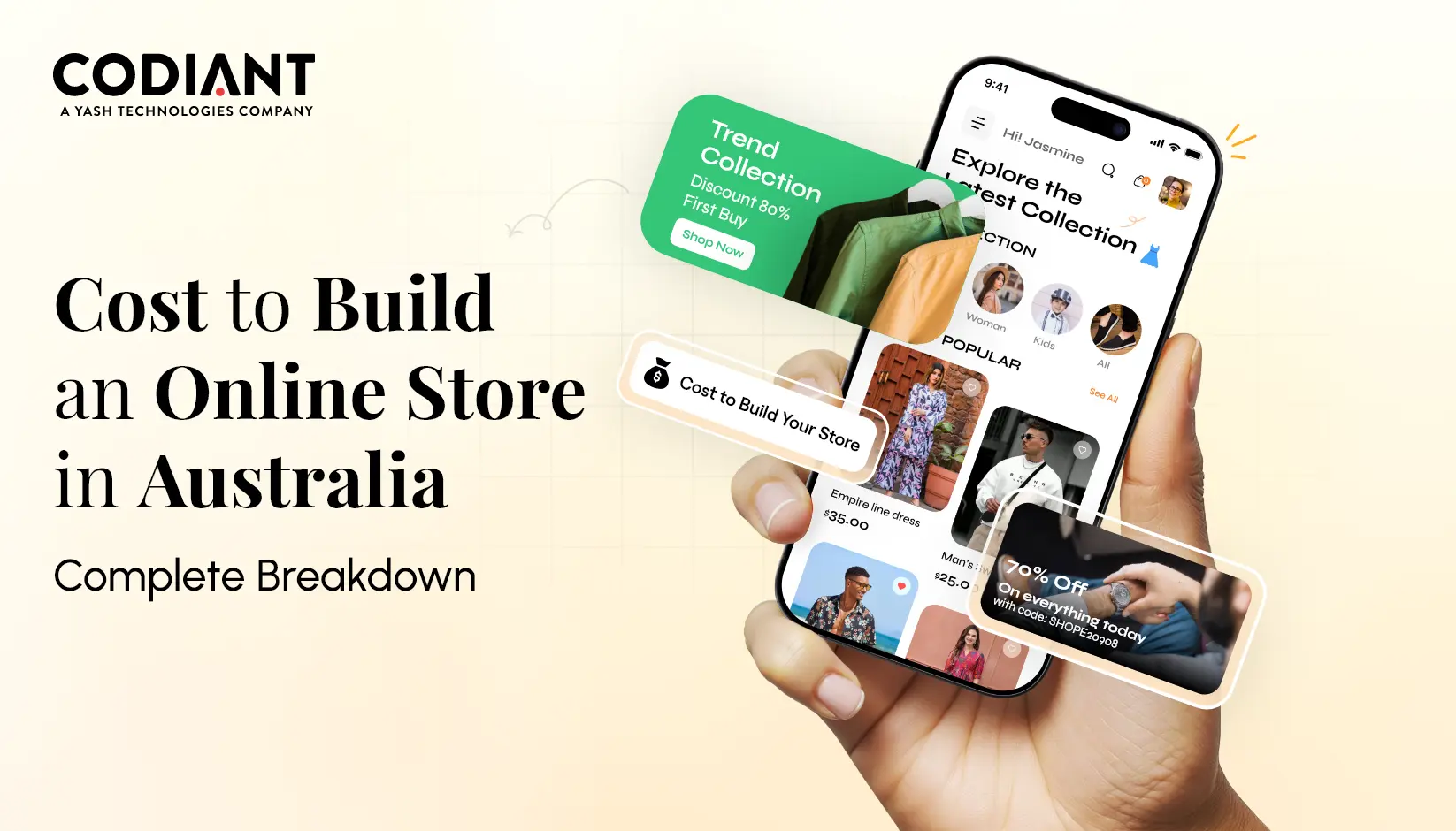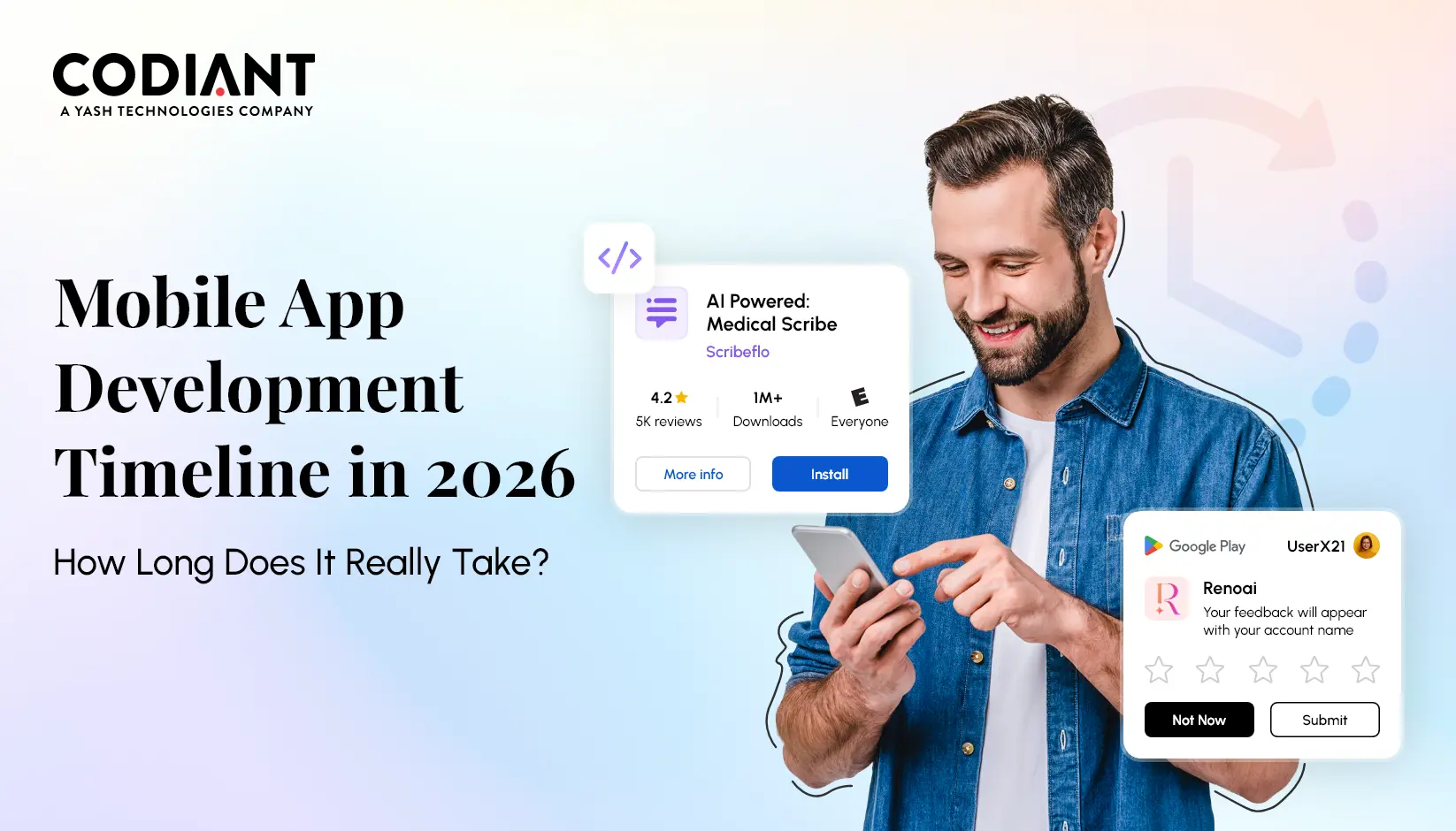How a Voice AI Agent Can Help You Get More Appointments and Leads
Table of Contents
Subscribe To Our Newsletter
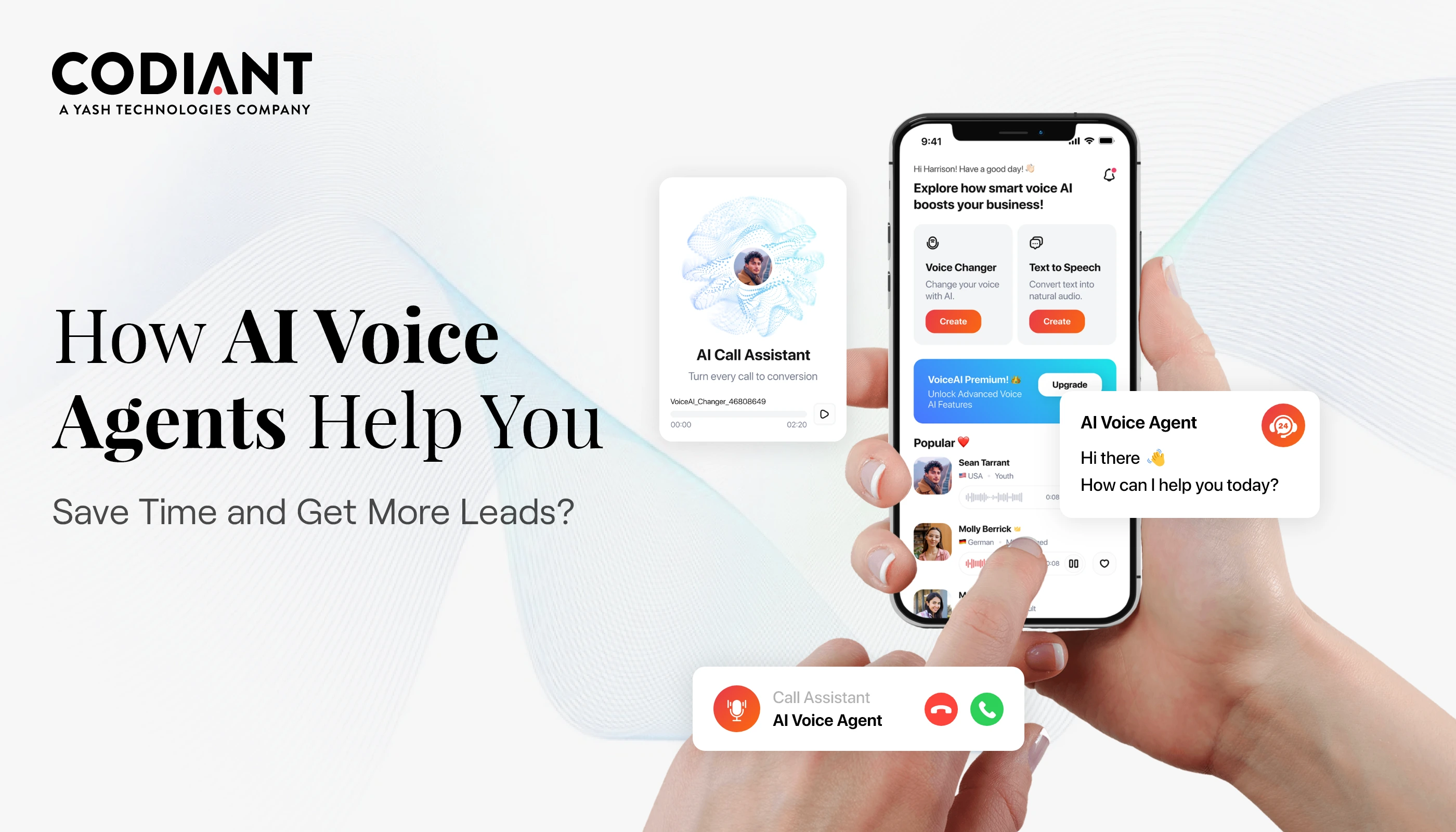
Missed calls, delayed responses, and lost leads are silent revenue killers for many businesses. In today’s fast-moving market, customers expect instant engagement – and that’s exactly where a voice AI agent for appointment booking steps in. This intelligent solution handles inbound and outbound calls, schedules meetings, and follows up automatically – without human intervention.
A voice AI assistant for business uses conversational intelligence to understand customer intent, respond naturally, and update CRM or calendar tools in real time. It’s not just automating calls – it’s transforming how businesses manage their first touchpoints with potential clients.
From capturing inquiries to confirming appointments, an AI voice bot for lead generation ensures no opportunity slips through the cracks. Businesses across healthcare, real estate, and professional services are now using voice AI to deliver consistent, 24/7 customer engagement that converts faster.
In this blog, we’ll explore how Voice AI Agents are helping companies generate more appointments, nurture leads, and drive sales – all through smart, conversational automation.
How a Voice AI Agent Boosts Appointments and Leads
The biggest challenge for most businesses today isn’t generating interest-it’s converting that interest into scheduled appointments and qualified leads. This is where a Voice AI Agent changes everything. By combining intelligent automation with human-like conversation, it ensures no inquiry, call, or opportunity slips through the cracks. Here’s how an AI voice bot for lead generation and appointment setting enhances efficiency, engagement, and conversions.
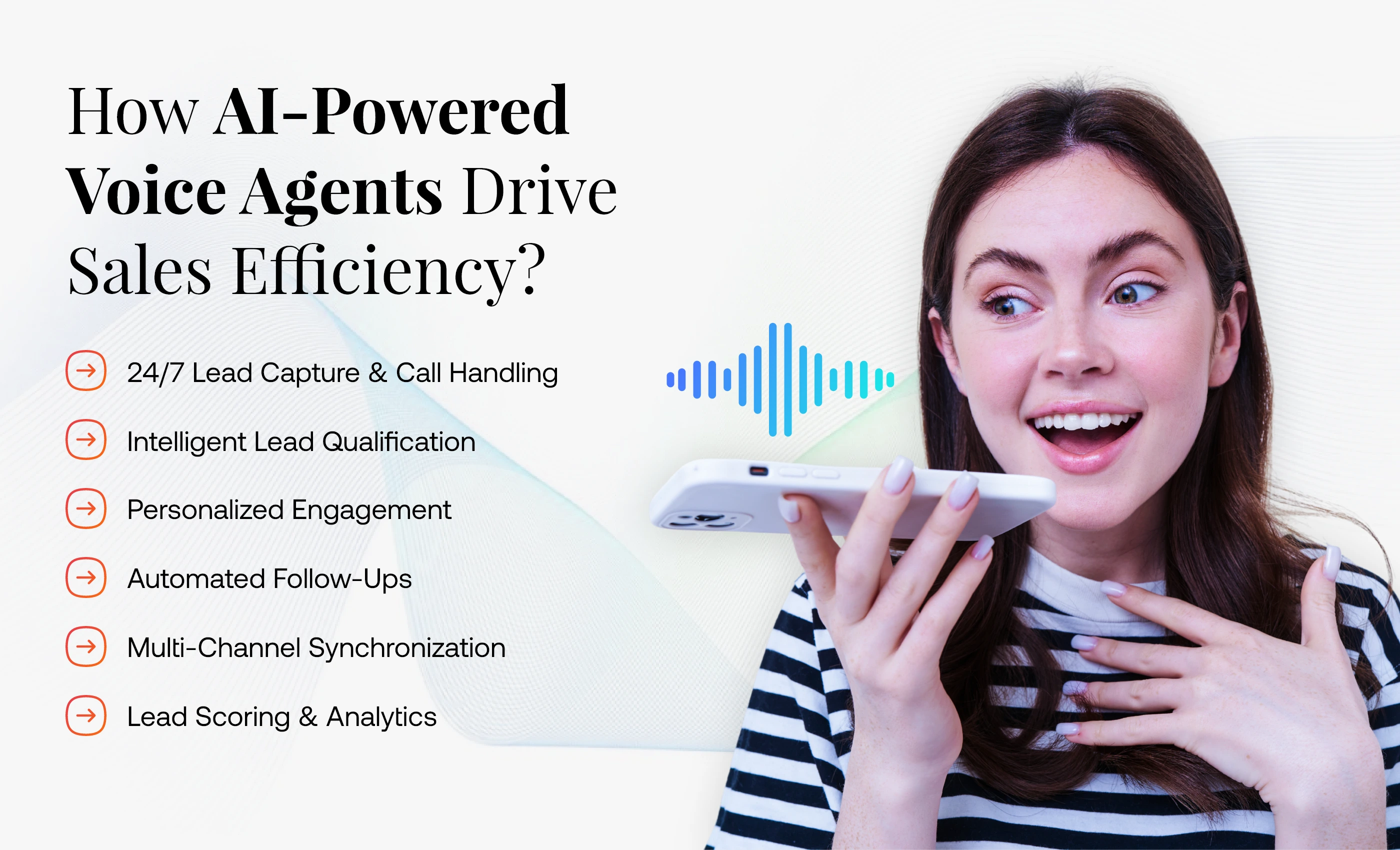
1. 24/7 Lead Capture and Call Handling
Most businesses lose up to 40% of potential leads simply because they can’t answer every call, especially after business hours. A Voice AI for inbound and outbound calls eliminates that limitation by staying active around the clock.
Your AI calling bot can greet customers, capture their contact details, qualify their interest, and even confirm appointments at any time of day. It doesn’t need breaks, training refreshers, or supervision-it just keeps performing. For example, a medical clinic that implemented a voice AI assistant noticed a 32% increase in appointment bookings after enabling 24/7 call handling.
Unlike traditional voicemail or IVR systems, these bots don’t frustrate customers with menus. Instead, they converse naturally:
“Hi, thanks for calling! Would you like to book a consultation or get more information?”
That single upgrade transforms missed opportunities into confirmed appointments, creating a consistent and reliable lead pipeline.
2. Intelligent Qualification
Not every caller is a high-value lead-and that’s where AI calling bots for appointment setting shine. Using Natural Language Processing (NLP) and intent detection, these systems identify what a caller wants, how ready they are to buy, and the urgency of their request.
The bot can automatically categorize leads based on keywords, tone, and intent. For instance, someone saying, “I’m comparing service providers,” might be tagged as a “research stage” lead, while “I’m ready to book now” gets instant priority scheduling.
This intelligent qualification process ensures that your sales team focuses only on warm, ready-to-convert leads-saving time, improving productivity, and accelerating closure rates. Over time, the AI learns from past conversations, refining its accuracy and response quality.
3. Personalized Engagement
Every lead value being understood. A voice AI agent can tailor its tone, pace, and responses to mirror human empathy and personality. By using data from previous interactions or CRM systems, it can personalize greetings (“Welcome back, Mr. Mac!”) or reference previous calls (“I see you spoke to our support team yesterday”).
This personalized engagement creates a connection that static forms or chatbots simply can’t replicate. For sales-driven industries like real estate, wellness, and healthcare, this authenticity often determines whether a prospect books or drops off.
AI voice technology helps build this trust at scale. It’s like having your best salesperson cloned-available for every single call, every day, delivering consistent, empathetic interactions that boost conversion rates.
4. Automated Follow-Ups
Even interested leads fall through if they’re not followed up promptly. A voice AI bot for lead generation ensures that never happens again. It automatically follows up with prospects who didn’t complete bookings, missed appointments, or requested call-backs.
For instance:
- After an inquiry: “Hi again! Would you like to confirm your appointment for tomorrow?”
- After a missed call: “We noticed we missed your call. Would you like to schedule a call-back?”
These follow-ups can be personalized and scheduled intelligently based on lead behavior and timing. The AI can also send reminders via integrated SMS or email systems, ensuring maximum attendance and fewer no-shows. This automation doesn’t just improve efficiency-it directly impacts your bottom line by converting dormant leads into paying customers.
5. Multi-Channel Sync
Modern lead generation happens across multiple touchpoints-calls, emails, forms, and social media. The true strength of a voice AI agent lies in how it syncs with CRMs, email systems, and scheduling tools to create one unified workflow.
For example:
- When a customer confirms an appointment via call, it automatically updates the CRM (like HubSpot or Salesforce).
- When they request details, it can trigger an email or SMS with the right information.
- When they cancel, it opens the slot for another lead automatically.
This multi-channel synchronization ensures data consistency, eliminates duplication, and gives your sales and marketing teams a real-time 360° view of every interaction. Essentially, it connects your voice AI with your entire digital ecosystem-turning isolated actions into a seamless, automated conversion funnel.
6. Lead Scoring and Analytics
Beyond booking calls, a voice AI for inbound and outbound calls acts as a powerful analytics engine. Every interaction is logged, analyzed, and scored based on behavior, language, and conversion probability.
For example, leads who frequently inquire about pricing might receive higher engagement scores, while those who ask basic questions could be placed in nurturing campaigns. AI agents in healthcare can enhance this lead scoring by providing smarter insights, helping sales teams prioritize high-intent prospects and allocate resources strategically.
Over time, analytics reveal patterns:
- Which campaigns generate the most appointment calls.
- What time of day sees the highest conversions.
- How tone, phrasing, or scripts affect lead outcomes.
Businesses can use these insights to refine both marketing campaigns and the AI’s future performance-making the system smarter with each interaction.
Ready to Turn Every Call into a Qualified Lead?
Don’t let missed calls or delayed responses cost your business potential clients.
Empower your sales and support teams with an AI voice agent that books appointments, qualifies leads, and follows up automatically – all in real time.
1. Boost conversions.
2. Automate scheduling.
3. Engage customers 24/7.
Want to see how Voice AI automation can multiply your appointments and leads instantly.
Case Study: Real Estate Agency Boosts Bookings by 40% with Voice AI
A mid-sized real estate agency struggled with lead drop-offs due to delayed callbacks and missed inquiries after hours. They deployed a voice AI bot for lead generation to manage both inbound and outbound calls.
Within three months:
- 40% increase in property viewing appointments.
- 60% reduction in missed follow-ups.
- 35% faster lead-to-booking cycle.
The AI agent handled prospect calls in real-time, confirmed schedules, reminded clients before viewings, and updated the CRM automatically. What previously required three full-time calling agents was now fully automated-with zero drop in customer satisfaction.
This simple integration not only cut operational costs but also doubled the agency’s lead-handling capacity without expanding its team. It’s a clear example of how voice AI helps generate more leads by merging speed, personalization, and data intelligence.
Understanding Voice AI Agents
A Voice AI Agent is an artificial intelligence–powered system designed to converse with people naturally through speech. It listens, understands, and responds just like a human representative only faster, more consistently, and available around the clock.
In the context of business operations, a voice AI agent for appointment booking takes the repetitive task of answering calls, scheduling meetings, and handling follow-ups off your team’s plate.
Instead of relying on manual inputs or limited phone menus, it understands intent, processes natural speech, and takes direct action, such as setting up appointments, checking availability, or logging leads in your CRM.
How Voice AI Agents Differ from Chatbots and IVRs
Traditional IVR (Interactive Voice Response) systems rely on pre-recorded prompts and numeric keypad inputs.
They can only follow rigid paths like “Press 1 for sales, Press 2 for support.” There’s no real conversation—just options and responses. AI Chatbots, on the other hand, use text-based communication. While they can respond intelligently to written queries, they don’t engage users through natural voice interaction.
A voice AI assistant for business bridges these two worlds. Unlike IVRs, it uses speech recognition and contextual understanding to carry on free-flowing, human-like dialogues.
And unlike chatbots, it adds the convenience of voice—a faster and more natural form of communication. The result is a smarter, more engaging experience where customers don’t feel like they’re talking to a machine.
The Technology Behind Voice AI
A voice AI agent operates through several connected technologies working together:
- Automatic Speech Recognition (ASR): Converts spoken words into text in real time, allowing the AI to “listen” and understand what a customer says.
- Natural Language Processing (NLP): Breaks down the meaning and context of sentences. For instance, it understands that “Book me an appointment tomorrow morning” means “schedule a meeting on the next day between 8 AM–12 PM.”
- Intent Recognition: Determines what the caller wants to do—book, reschedule, or inquire—and triggers the correct workflow.
- Text-to-Speech (TTS): Translates the AI’s responses back into lifelike voice, maintaining a conversational tone that feels natural and polite.
Together, these components make it possible for the AI to engage in two-way, contextual conversations that go far beyond simple keyword matching.
Conversational AI for Sales and Marketing
The rise of conversational AI for sales and marketing has changed how businesses interact with leads. Voice AI agents are now used to qualify leads, answer questions, and book appointments within seconds of receiving a call or inquiry.
Instead of waiting for human callbacks, prospects receive instant responses. The AI can even personalize conversations—using names, recognizing returning callers, and adjusting its tone based on customer sentiment.
For example, if a potential client says, “I’m looking to schedule a demo next week,” the AI can instantly check the sales team’s calendar, suggest available time slots, and confirm the booking – all without human intervention. This instant, context-aware engagement improves customer satisfaction and increases the chances of conversion.
Typical Voice AI Workflow
Here’s a simplified look at how a voice AI agent for appointment booking works in a business setting:
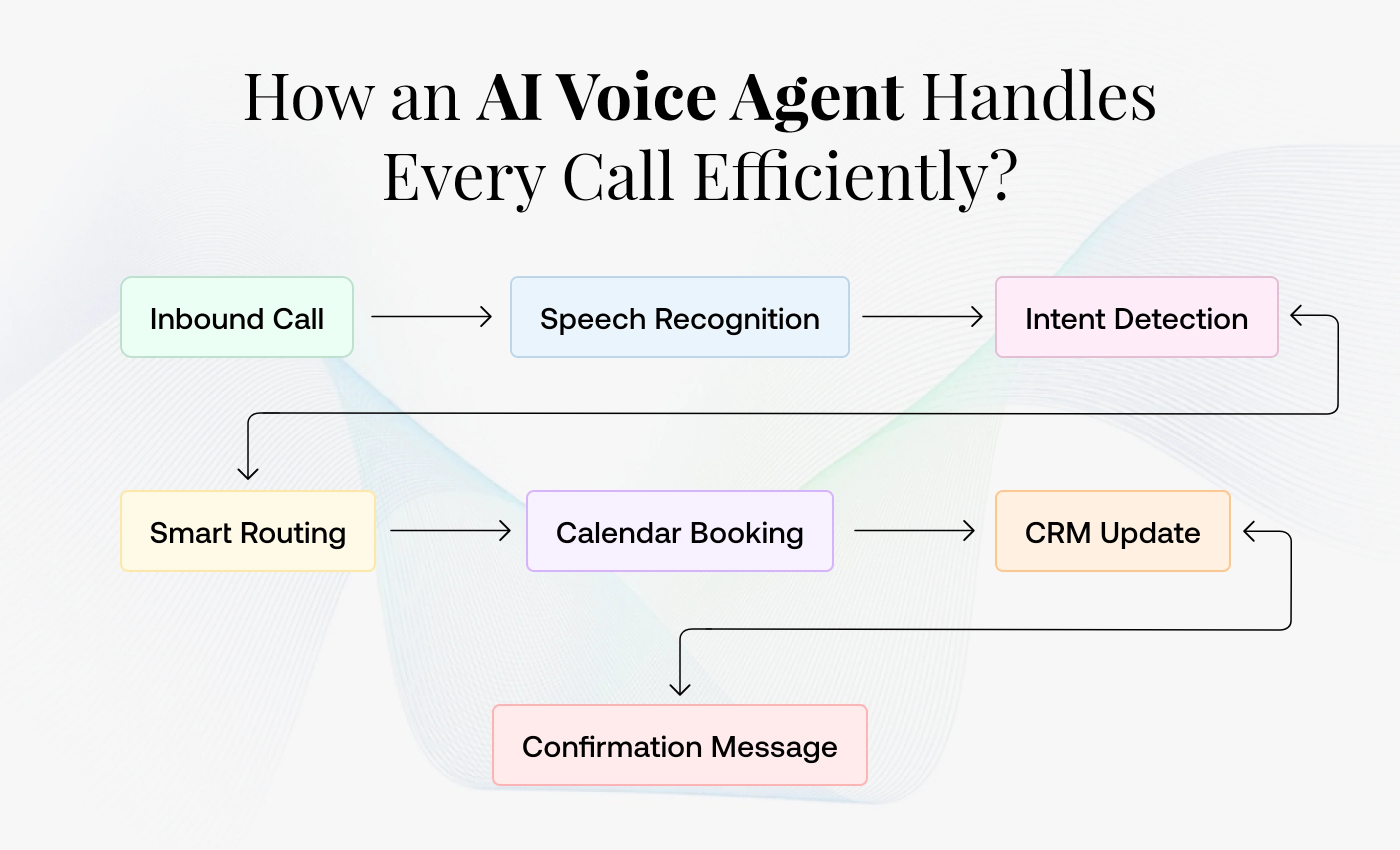
- The AI answers the incoming call and greets the customer.
- It listens to the caller’s request and recognizes their intent (e.g., “I’d like to reschedule my appointment”).
- Based on that intent, it retrieves data from the integrated calendar or CRM system.
- The AI offers suitable time slots or confirms existing appointments.
- Once confirmed, it logs all details and updates the CRM in real time.
- A follow-up message or reminder is automatically sent via SMS or email.
This end-to-end automation minimizes manual effort, reduces missed opportunities, and ensures that every interaction is recorded for future insights.
Integration Capabilities
A key strength of modern AI phone assistants for businesses is their ability to integrate seamlessly with existing tools. Voice AI systems connect directly with platforms like Google Calendar, Microsoft Outlook, HubSpot, Salesforce, and Zoho CRM. This allows them to read availability, schedule meetings, and update customer records instantly. Many solutions also support APIs and webhooks for connecting to custom enterprise systems or booking platforms.
Example
Consider a dental clinic that receives hundreds of calls each week for appointments, cancellations, and inquiries. Instead of relying on receptionists to manage every call, the clinic deploys a voice AI agent that automatically greets patients, confirms or reschedules bookings, and even sends reminders.
If a patient calls after hours to change an appointment, the AI handles it instantly and updates the calendar for the next day.
The result: fewer missed calls, higher booking rates, and improved patient satisfaction—all achieved with minimal staff effort.
Read More: How to Build AI Agents That Can Speed Up Your Work and Reduce Other Expenses
Why Businesses Lose Leads Without Automation

Every business invests heavily in marketing to attract potential customers. Yet, a surprising percentage of those leads never turn into appointments or sales—not because of poor quality, but because of poor timing and manual processes. Without automation, leads slip through cracks caused by missed calls, human fatigue, and inconsistent follow-ups.
Missed Calls After Business Hours
The most common reason businesses lose potential clients is simple—no one picks up after hours. Studies show that 44% of inbound calls come outside regular office hours, especially in service-based industries like healthcare, real estate, and home maintenance.
Unfortunately, only a small fraction of businesses have round-the-clock staff to respond. The result? Prospects move on to competitors.
In another report, companies that fail to respond within an hour of receiving a lead are 7× less likely to qualify that lead than those who reply instantly.
Delays are fatal in sales cycles where immediacy builds trust. A potential customer looking to book a demo or appointment will likely go with whoever answers first—and that’s rarely a human team working 9–5.
Human Fatigue and Response Delays
Even during working hours, human limitations hinder conversion. Reps juggle multiple calls, emails, and meetings—inevitably slowing down their ability to respond fast. According to a Chili Piper report, the average company response time is 42 hours, while only 37% of businesses respond to new leads within an hour.
Speed matters. Businesses that respond within 5 minutes are 100× more likely to connect with a prospect and 21× more likely to convert that lead into an appointment. Every minute of delay decreases the likelihood of conversion dramatically—a pattern consistent across industries.
Manual scheduling doesn’t scale well either. Agents tire, multitask, or go offline—leading to abandoned calls, missed opportunities, and poor first impressions. In contrast, when you automate appointment scheduling with AI, every incoming call or message gets a consistent, timely response—without burnout, breaks, or off days.
Inconsistent Follow-Ups
Follow-up inconsistency is another silent killer of potential deals. Studies show that 80% of leads never convert simply because businesses fail to follow up effectively. Without an organized system, messages pile up, reminders get lost, and valuable prospects grow cold.
Moreover, around 35–50% of all sales go to the vendor that responds first. If your sales or service team takes hours—or days—to follow up, competitors who respond faster will close those deals instead. The financial impact compounds over time, draining thousands in potential monthly revenue.
Quantifying the Impact
- 78% of buyers choose the company that responds first.
- Businesses lose up to 30% of potential leads because of slow responses or missed calls .
- The longer the delay, the lower the close rate—dropping by up to 400% within the first 10 minutes of waiting.
In short, manual scheduling and human-dependent communication are no longer sustainable in fast-moving markets. Missed calls, slow responses, and weak follow-ups silently erode your pipeline and cost real revenue.
This is exactly where AI voice agents bridge the gap-automating customer engagement, ensuring instant response, and capturing every opportunity, every time.
Read more: Top AI Assistant Trends For 2025
Which Industries Benefit Most from AI Voice Bots for Lead Generation?
The adoption of AI voice assistants for business is no longer limited to tech giants or call centers. Today, every appointment-driven industry from clinics and real estate agencies to auto dealerships and salons is realizing the potential of voice automation.
A virtual AI receptionist for businesses can now handle thousands of inbound and outbound calls, respond to customer queries in real time, and schedule appointments without human intervention.
Here’s how different industries are using AI voice bots to improve efficiency, boost engagement, and generate more qualified leads.
- Healthcare
In healthcare, timely communication is critical. Clinics, hospitals, and private practitioners often face the challenge of missed calls, last-minute cancellations, and delayed responses.
An AI voice bot for healthcare automates the entire patient communication process—from confirming appointments and reminding patients about upcoming visits to following up on prescriptions or lab results.
These bots can answer routine inquiries about doctor availability, clinic hours, or insurance coverage and even sync with EHR systems for seamless data management.
For example, when a patient calls after hours, the AI bot can still handle the query, book an appointment, or reschedule one instantly. This not only reduces the workload of front-desk staff but also ensures that no patient interaction is lost due to timing or human limitation.
- Real Estate
Real estate is another sector where AI voice automation is transforming lead conversion. Agents often lose potential buyers because they can’t respond immediately to inquiries. An AI voice bot for real estate solves this by answering property queries 24/7, scheduling viewings, and following up with interested clients.
The bot can qualify leads by asking simple questions such as preferred location, budget, or property type and then forward high-intent leads directly to agents. It can also make proactive outbound calls to remind clients about open houses or send updates about new listings.
As a result, real estate agencies experience faster response times, higher engagement, and better appointment-to-conversion ratios—all while minimizing manual effort.
- Automotive
In the automotive industry, speed and convenience are key drivers of customer satisfaction. Dealerships and service centers receive dozens of inquiries daily about test drives, servicing, and maintenance schedules.
A voice AI assistant for business in this sector can automate appointment scheduling, send service reminders, and handle customer follow-ups post-visit.
For instance, an AI voice bot can call a customer after a scheduled service, confirm satisfaction, and even suggest additional services or offers.
Dealerships can use voice automation to book test drives directly from incoming calls or run outbound campaigns for new vehicle launches. The result is faster lead handling, reduced missed opportunities, and consistent brand engagement.
- Beauty and Wellness
Salons, spas, and wellness centers thrive on repeat clients and efficient scheduling. However, managing multiple bookings, cancellations, and walk-ins manually often leads to errors or missed opportunities.
A virtual AI receptionist for businesses in this sector handles customer calls professionally and ensures real-time slot management.
It can confirm appointments, send automated reminders, and even reschedule sessions when needed. Beyond scheduling, the bot can share information about available services, ongoing offers, or membership programs.
By maintaining timely and personalized communication, beauty and wellness brands not only increase client retention but also free up their staff to focus on customer experience rather than admin work.
- Financial Services
In financial services, client trust and response speed directly impact conversions. Banks, insurance providers, and lending institutions use AI voice bots to streamline customer communication for consultations, claims, and loan inquiries.
An AI bot can act as a voice AI assistant for business by handling routine tasks such as collecting applicant details, verifying information, and scheduling follow-up calls with advisors.
It can also make outbound calls to remind clients about document submissions, EMI payments, or policy renewals. The automated, compliant, and always-available nature of these bots ensures smoother client journeys and faster decision-making processes.
- B2B Services
For B2B organizations, particularly those in sales and marketing, outbound communication is essential for growth. A voice AI assistant for business can make this process more efficient by automatically reaching out to leads, qualifying them through dynamic conversations, and booking meetings directly on the calendar.
Instead of spending hours on cold calls, sales teams receive pre-qualified prospects who are genuinely interested in their services. Moreover, AI voice agents can follow up with leads who haven’t responded to emails or previous outreach attempts, significantly improving lead conversion rates.
Businesses can scale their outreach without increasing headcount, ensuring consistent pipeline activity and measurable ROI.
Reimagine Customer Conversations Across Industries
Whether it’s booking appointments in clinics or capturing sales leads in real estate, AI voice agents deliver human-like precision at scale.
How Voice AI Works?
Every time a Voice AI Agent picks up a call, confirms an appointment, or responds to a query, a powerful combination of AI technologies works in the background to make that conversation sound natural and meaningful.
This process is what we refer to as the AI voice technology for call automation — a seamless orchestration of multiple layers of artificial intelligence, speech processing, and data integration designed to understand, respond, and take action in real time.
Here’s a simple look at how this system operates.
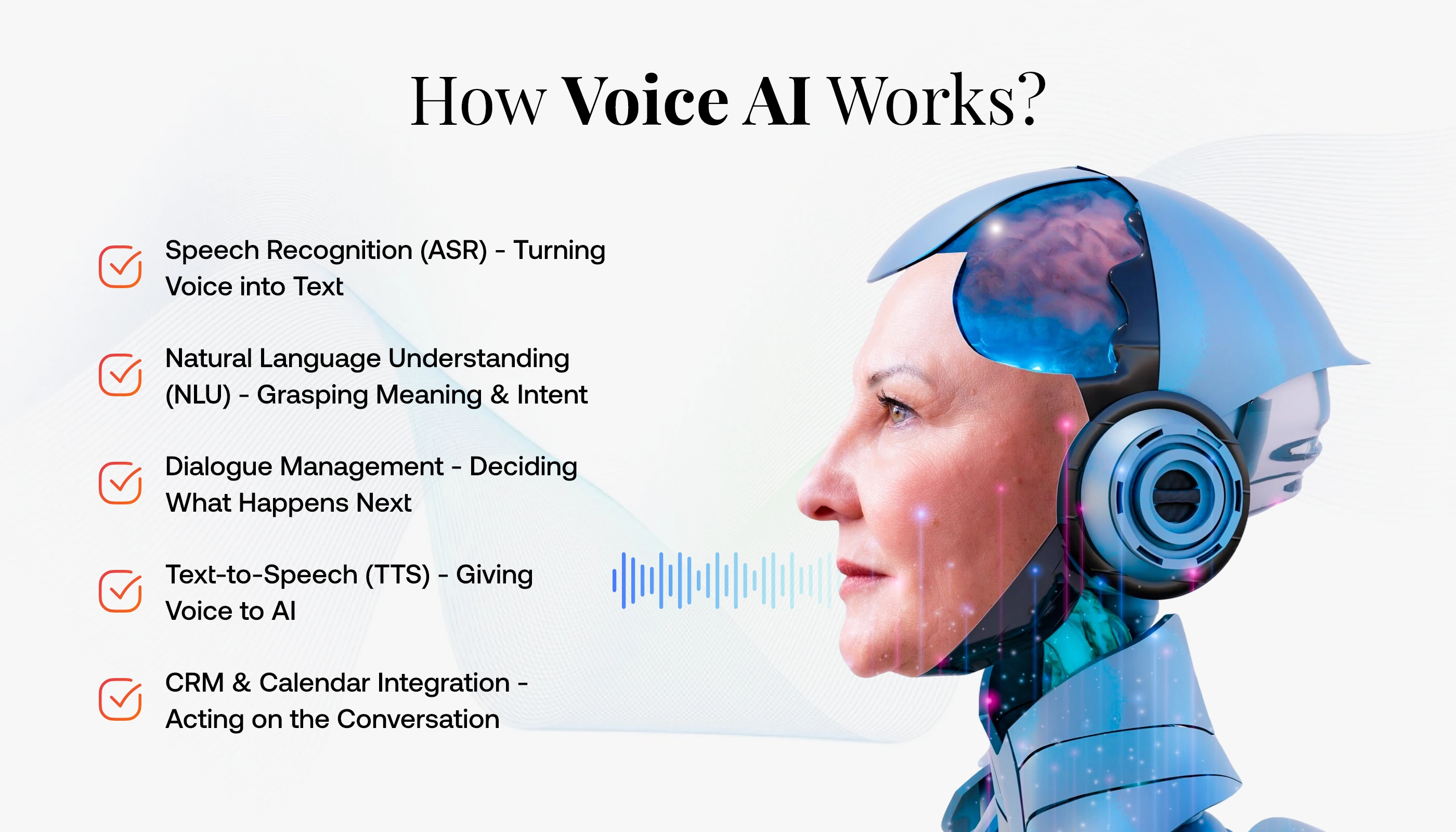
1. Speech Recognition (ASR) – Turning Voice into Text
The process begins the moment a customer speaks. Automatic Speech Recognition (ASR) converts the spoken words into text that the system can process. It breaks down sound waves, filters out background noise, and identifies words and phrases.
Advanced ASR engines, such as those used in Conversational AI for sales and marketing, are trained on thousands of hours of real-world data, enabling them to handle different accents, speaking speeds, and tones with remarkable precision.
Modern ASR systems now achieve accuracy levels of over 90%, depending on audio quality and language clarity. This makes them reliable enough to handle sensitive tasks such as confirming bookings or verifying user details during calls.
2. Natural Language Understanding (NLU) – Grasping Meaning and Intent
Once the words are transcribed, the next layer—Natural Language Understanding (NLU)—interprets the message. It analyzes the sentence structure, context, and intent behind what was said.
For example, if a customer says, “I’d like to book a service for tomorrow morning,” the NLU engine identifies two key elements: the intent (“book a service”) and the time reference (“tomorrow morning”).
This step is critical for determining what action the AI agent should take next. The accuracy of understanding customer intent depends on the quality of the NLU model, training data, and the diversity of linguistic patterns it has been exposed to.
In most enterprise-grade systems, accuracy rates can exceed 85–90%, especially when fine-tuned for specific industries like healthcare, real estate, or automotive services.
3. Dialogue Management – Deciding What to Do Next
After interpreting intent, Dialogue Management comes into play. This is the brain of the Voice AI system. It decides the next response or action based on business logic, available data, and previous context. For instance, if the customer is booking a slot, the agent checks the schedule, confirms availability, and either confirms or offers alternative times.
Dialogue management ensures the conversation stays natural and goal-oriented. It remembers user inputs from earlier in the chat and maintains flow — preventing the agent from sounding robotic or repetitive.
4. Text-to-Speech (TTS) – Giving Voice to AI
Once the system decides what to say, the Text-to-Speech (TTS) component transforms the response into a human-like voice.
Today’s AI voice engines can modulate tone, pace, and emotion, creating an experience that feels conversational rather than mechanical.
This technology is central to Conversational AI for sales and marketing, as it enables businesses to engage prospects warmly, handle objections politely, and maintain consistency across hundreds of calls simultaneously — without fatigue or deviation from brand tone.
5. CRM and Calendar Integration – Acting on the Conversation
The final layer is CRM and Calendar Integration. Once the conversation concludes, the Voice AI Agent automatically records outcomes and updates systems like Salesforce, HubSpot, or Google Calendar.
This allows sales teams and service providers to view every scheduled meeting, call note, or lead detail without manual entry.
AI voice assistants can integrate seamlessly with CRM and scheduling tools. Through APIs and connectors, these systems can book appointments, log leads, trigger follow-ups, and even send reminders or emails to customers instantly.
Accuracy and Reliability in Understanding Intent
A common question is: “How accurate are AI voice agents in understanding customer intent?”
The answer lies in continuous learning. As these systems interact with more users, they analyze conversational data and refine their models. This ongoing training improves both recognition accuracy and contextual understanding. In fact, advanced AI agents can now handle layered conversations, interruptions, and tone variations almost like trained human agents.
Bringing It All Together
In simple terms, every AI-driven call moves through five core layers — listening, understanding, deciding, speaking, and recording. Together, these technologies form an intelligent ecosystem that can manage thousands of conversations daily while keeping data synchronized across CRM, calendars, and lead systems.
Benefits of Using Voice AI Agents
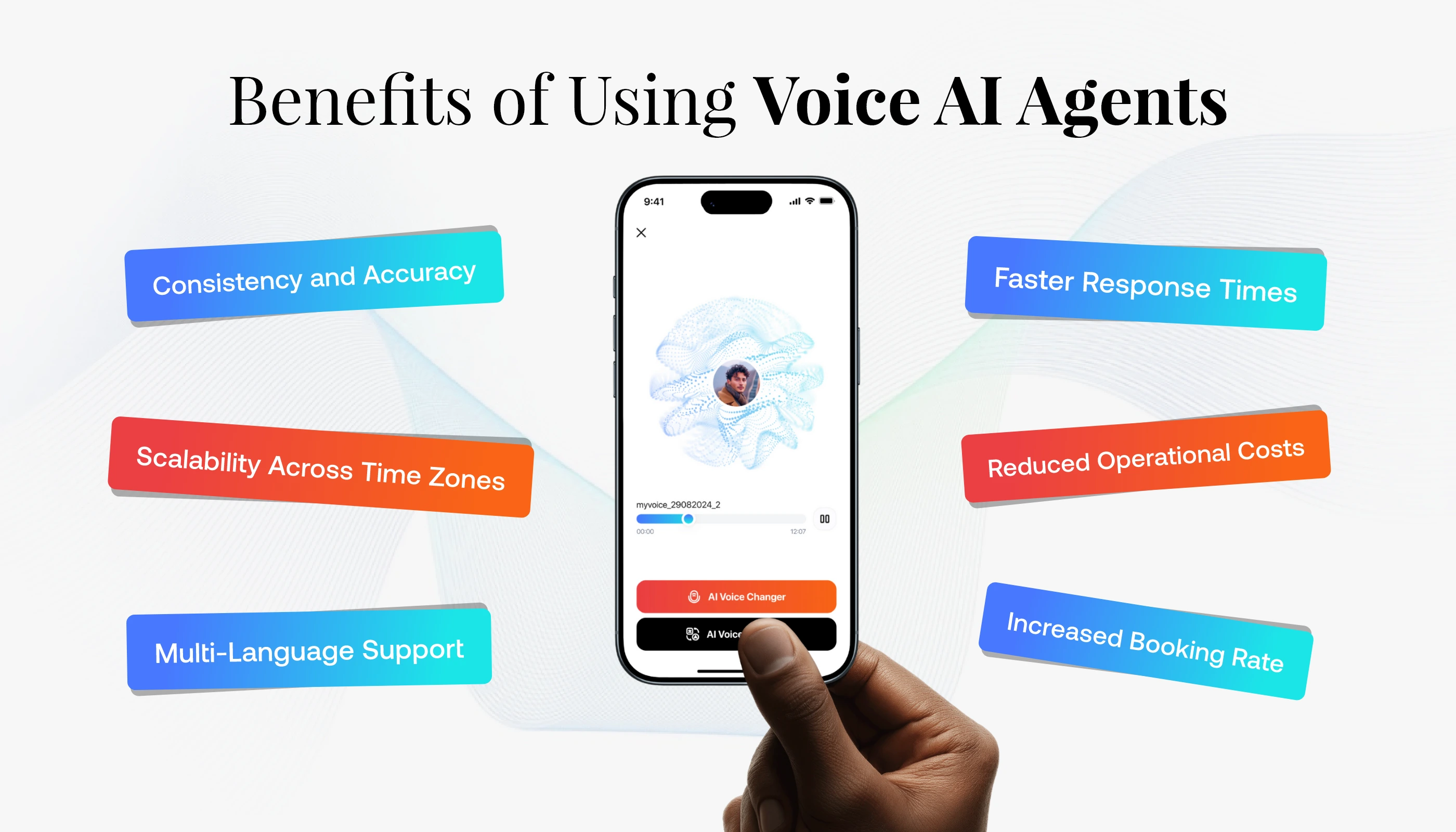
A Voice AI assistant for business is designed to simplify and speed up the way companies handle leads, schedule appointments, and interact with customers. It automates repetitive call-based tasks, reduces human effort, and improves overall efficiency. Below are some clear, measurable benefits of voice AI for lead management that show why businesses are investing in this technology.
1. Faster Response Times
Speed matters when converting leads. Studies show that leads contacted within the first five minutes are far more likely to convert than those reached later. In most businesses, calls often go unanswered after hours or when staff are busy.
A Voice AI agent for customer engagement eliminates that delay. It can instantly answer inbound calls, collect details, qualify leads, and even schedule appointments in real time. For outbound leads, it can automatically call prospects, follow up on previous inquiries, and send reminders. This ensures no lead is lost due to missed or late responses.
Businesses that use AI voice agents typically see response times improve by up to 80–85%, helping them reach more potential customers faster and stay ahead of competitors.
2. Reduced Operational Costs
Running a customer support or sales call team involves significant costs—salaries, training, supervision, and office infrastructure. In comparison, a voice AI assistant for business can manage hundreds of calls at a fraction of the cost. It doesn’t need breaks, overtime pay, or replacements for night shifts.
By automating appointment booking and lead follow-ups, companies can cut operational costs by 30–50%. This makes it ideal for small and medium businesses that want to scale without expanding headcount. AI voice agents also help avoid human errors and the hidden cost of lost opportunities, leading to a more predictable cost structure.
3. Increased Booking Rate
A missed or delayed response often means a missed appointment. A Voice AI agent for customer engagement ensures that doesn’t happen. It can handle scheduling, send booking confirmations, reminders, and even reschedule automatically when needed.
This consistent communication increases the chances of a lead becoming a confirmed appointment. Businesses in sectors like healthcare, real estate, and automotive report 25–40% higher booking rates after introducing voice AI systems. They also experience fewer no-shows because reminders are automatically sent through calls or texts.
4. Consistency and Accuracy
Human agents can make mistakes, forget to log data, or vary in tone and accuracy. AI voice systems deliver the same quality of interaction every time. They follow scripts perfectly, ensure every question is asked, and record all responses in the CRM.
This ensures accurate data entry, reliable follow-ups, and clear communication across the customer journey. A voice AI assistant for business maintains brand tone, avoids errors, and gives managers a complete record of every call for review or training purposes.
The result is higher reliability and a smoother experience for customers who expect consistency across every interaction.
5. Scalability Across Time Zones
Scaling a human team to operate 24/7 across different time zones is difficult and expensive. A Voice AI agent for customer engagement can manage calls and leads around the clock. It can respond instantly to inquiries, schedule meetings, or provide updates—regardless of where or when the customer calls.
This capability is especially useful for global businesses, remote service providers, or companies dealing with international clients. Many organizations have seen 2x more global coverage and improved satisfaction scores after adopting voice AI because customers never have to wait for business hours to get a response.
6. Multi-Language and Accent Support
Modern AI voice systems support multiple languages and understand different accents, making them suitable for diverse audiences. A single voice AI assistant for business can communicate in English, Spanish, Arabic, or other languages as needed, ensuring no customer feels left out.
These systems also achieve over 90% accuracy in speech recognition, even in noisy environments. For businesses in regions with mixed language users, this feature helps them engage a broader customer base without hiring multilingual staff.
AI vs. Human Agent Performance Comparison
| Metric | Human Agent | Voice AI Agent |
| Average Response Time | 5–30 minutes | Instant (0–5 seconds) |
| Operating Cost | $3,000–$5,000/month per agent | Around 70% lower |
| Availability | 8–10 hours/day | 24/7 |
| Error Rate | 3–10% | <1% |
| Call Handling Capacity | 1 call at a time | 100s of concurrent calls |
| Consistency | Varies by person | Always consistent |
This simple comparison shows how AI voice agents outperform manual operations in speed, scale, and reliability. The goal isn’t to replace human agents but to support them by handling repetitive, time-sensitive tasks – so humans can focus on relationship building and closing deals.
What’s the Difference Between a Voice AI Agent and a Chatbot?
As conversational technologies evolve, many businesses are moving from text-based chatbots to voice-driven AI systems. While both aim to automate customer interaction, their capabilities, engagement quality, and impact on conversions differ significantly.
Understanding these differences helps businesses choose the right automation strategy—especially if their goal is to improve appointment booking and lead generation.
| Feature | Voice AI Agent | Chatbot |
| Mode | Voice | Text |
| Engagement Level | High (natural, human-like conversation) | Moderate (limited to scripted replies) |
| Use Case | Appointment scheduling, lead follow-ups, call routing | FAQs, web chat, support automation |
| Conversion Rate | 25–40% higher due to real-time engagement | Generally lower due to slower interaction pace |
1. Mode of Interaction
A Voice AI Agent interacts through speech, allowing customers to speak naturally as they would with a human representative. This makes it ideal for handling inbound and outbound calls, appointment confirmations, or quick lead qualification.
In contrast, chatbots rely on typed text, which limits engagement for users who prefer speaking over typing—especially during mobile interactions or while multitasking.
2. Engagement and Personalization
Voice AI brings tone, pauses, and sentiment into the conversation, creating a more human-like experience. It listens, understands, and responds in real time, helping users feel heard and valued. This emotional layer improves trust and engagement.
Chatbots, however, remain transactional. Their static tone and dependency on pre-set text templates often make conversations feel mechanical, leading to shorter and less productive interactions.
3. Context and Use Cases
While chatbots are effective for support tickets and FAQs, they struggle with high-intent conversations that require real-time understanding—like scheduling, callbacks, or qualification.
Voice AI assistants for business excel here, managing appointments, verifying details, and syncing updates directly with CRMs and calendars. They also work across multiple industries like healthcare, real estate, or automotive, where instant voice communication is vital.
4. Conversion and Business Impact
Studies show that real-time voice conversations can increase lead conversion by 25–40%. A voice AI agent captures leads even outside business hours and follows up automatically, ensuring no inquiry is missed.
Meanwhile, chatbots depend on users’ willingness to type, reducing engagement rates and slowing response times.
Why Voice-First Automation Is the Future?
As customers expect instant, natural communication, voice-first automation is becoming the new standard. Businesses adopting AI-powered voice systems report higher appointment rates, lower operational costs, and better customer satisfaction.
A reliable voice AI agent development company can design tailored voice assistants that understand domain-specific language, handle regional accents, and integrate smoothly into existing workflows.
How Much Does It Cost to Develop an AI Voice Assistant for a Business?
When businesses start exploring automation, one of the first questions that comes up is, “How much does it cost to develop an AI voice assistant?”
The answer depends on what you need the system to do. Voice AI solutions can be simple call responders or advanced, multi-language agents that handle scheduling, lead qualification, and follow-ups across departments.
Key Factors That Affect Cost
- Complexity of Features: A basic voice bot that only books appointments is easier and cheaper to build. Adding capabilities like CRM updates, lead scoring, and analytics increases both the development time and cost.
- Integration Requirements: The more systems your agent connects with such as calendars, CRMs, or marketing tools the more integration work is required. Each additional connection adds to the overall project cost.
- Voice Quality: Using premium text-to-speech and speech recognition engines that sound more natural improves user experience but raises development and licensing costs.
- Language and Accent Support: Supporting multiple languages or regional accents involves additional model training and fine-tuning, making the solution more inclusive but also more expensive.
Typical Pricing Range
While every project is unique, most voice AI solutions fall within these general ranges:
- $8,000–$20,000: Basic AI voice bot for appointment setting with minimal integrations.
- $25,000–$50,000: Advanced assistant with calendar sync, CRM integration, and intelligent responses.
- $60,000–$100,000+: Full-scale enterprise solution with multilingual support, analytics, and adaptive voice learning.
Core Development Stages
A reliable voice AI agent development company will follow a structured process to ensure accuracy and usability:
- Discovery: Define goals, audience, and functional requirements.
- Voice Design: Decide the tone, flow, and conversational structure.
- Training: Use AI and NLP to train the agent on real customer interactions.
- Integration: Connect the AI system to CRMs, scheduling tools, and communication platforms.
- Testing: Run multiple test cases to ensure voice accuracy and conversation relevance.
- Deployment: Launch the solution and monitor its real-time performance for improvements.
Choosing the Right Partner
Selecting the right voice AI agent development company like Codiant can make a big difference in how well your solution performs. Choose a partner experienced in conversational AI, voice modeling, and business system integrations. The right company will tailor the AI to your business objectives and deliver a scalable solution that helps you automate appointment scheduling, reduce manual workload, and convert more leads.
Future of Voice AI in Lead Generation
The future of AI voice bots for lead generation looks increasingly promising as technology becomes more human-like, contextual, and emotionally intelligent. Businesses are quickly realizing that AI voice technology for call automation is not just about convenience—it’s about creating continuous, high-quality engagement that converts.
Here’s what’s ahead:
- Emotional AI: Voice bots will recognize tone, mood, and sentiment, allowing them to respond with empathy just like a skilled sales rep.
- Contextual Recall: Future AI agents will remember past conversations and use that context to personalize every interaction.
- Hyper-Personalization: Instead of generic scripts, AI voice agents will tailor dialogues to user preferences, history, and real-time intent.
- Multilingual Models: Global businesses will deploy AI voice systems capable of seamless switching between languages and regional accents.
The next evolution will see AI phone assistants for businesses transform into autonomous sales agents handling inquiries, nurturing leads, and closing appointments without human intervention.
By 2028, experts predict voice AI will manage nearly 80% of appointment-based calls, enabling businesses to scale faster, reduce costs, and deliver superior customer engagement effortlessly.
Conclusion
Voice AI is transforming how appointment-driven businesses operate by eliminating manual scheduling bottlenecks and missed opportunities. With voice AI for inbound and outbound calls, companies can manage customer interactions around the clock, handle large call volumes, and follow up with leads instantly.
This technology ensures every inquiry is answered, every appointment is booked, and no potential lead slips through the cracks.
As customer expectations rise, automation is no longer optional – it’s essential. Businesses that adopt AI voice agents not only save time and costs but also build stronger customer relationships through faster, more personalized engagement.
If you’re ready to scale your lead generation and appointment booking process, now is the time to explore voice AI automation. Streamline your operations, enhance responsiveness, and convert conversations into real opportunities.
Transform Every Call into a Sales Opportunity
Automate appointment booking, qualify leads, and boost conversions effortlessly with Voice AI.
Frequently Asked Questions
A Voice AI Agent is an intelligent system that can talk to customers just like a human. It listens to their requests, understands what they need, and helps them schedule appointments automatically. The AI connects with calendars, CRMs, or booking tools to confirm, reschedule, or cancel appointments without human help.
A Voice AI Agent responds instantly to inquiries—day or night—so no lead goes unanswered. It qualifies prospects, answers questions, and guides them toward booking or buying. This quick and consistent engagement increases trust and boosts conversion rates significantly.
Setting up a Voice AI Agent usually requires a call management system, CRM integration, and access to your scheduling or booking software. The AI vendor customizes the bot with your brand voice, business hours, and FAQs to make it work smoothly for your operations.
Yes. Modern AI voice agents are trained using advanced speech recognition and natural language models. They can understand different languages, accents, and speech patterns, making them suitable for global and multilingual audiences.
Voice AI Agents follow strict data security standards such as GDPR and HIPAA (where applicable). All conversations are encrypted, and personal information is stored securely. Reliable providers also use role-based access and regular audits to prevent unauthorized access.
AI voice bots work 24/7, don’t need breaks, and respond instantly. They reduce staffing costs, minimize errors, and handle large call volumes efficiently. Most importantly, they ensure consistent, polite, and accurate communication across every customer interaction.
Once integrated, the AI can make outbound calls to confirm or remind customers about appointments. It can also follow up with leads who haven’t responded, update CRM entries, and send SMS or email confirmations—all without manual effort.
Absolutely. Voice AI Agents can connect with platforms like Salesforce, HubSpot, Zoho, Google Calendar, and Outlook. This helps them check availability, log customer data, and automatically update appointment statuses.
Tools like Codiant’s Voice AI Agent, Google Dialogflow, and Twilio Voice AI are excellent for small and medium businesses. They’re affordable, easy to integrate, and help automate appointment booking, lead follow-ups, and customer interactions efficiently.
Featured Blogs
Read our thoughts and insights on the latest tech and business trends
How to Hire AI Developers for Automation & Smart Applications- A Complete Guide for 2026
- January 29, 2026
- Staff Augmentation
In a Nutshell AI hiring in 2026 is a business decision, not just a technical one. Most AI failures happen due to wrong hiring models and unclear scope, not bad ideas. Successful automation starts by... Read more
How Much Does It Cost to Build an eCommerce Platform in Australia?
- January 27, 2026
- E-commerce
In a Nutshell eCommerce development costs in Australia typically start from AUD $10,000–$25,000 for basic stores, while advanced or enterprise platforms can range from AUD $80,000 to $250,000+ depending on complexity. Shopify offers a lower... Read more
How Long Does It Take to Develop an App in 2026?
- January 21, 2026
- Mobile App Development
In a Nutshell App development timelines depend more on scope clarity than technology speed. Simple apps take 2–4 months; complex platforms often require 9–12+ months. MVPs typically launch within 6–16 weeks when features remain tightly... Read more

